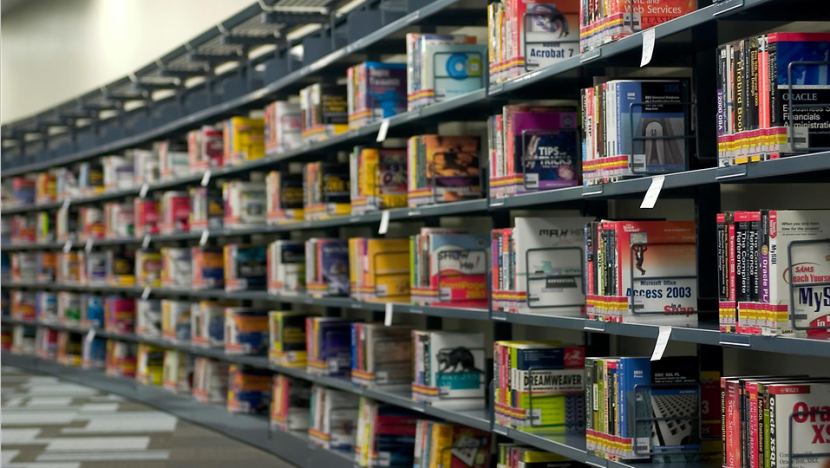Recycle or give away? How some libraries deal with unwanted books
Books that are damaged will be sent for recycling, say the National Library Board and the Nanyang Technological University.

Library books on shelves. (File photo: NLB)

This audio is generated by an AI tool.
SINGAPORE: As part of managing libraries, there is a system to review the books to ensure they remain relevant and in good condition.
Unwanted books may be redistributed or recycled depending on several factors, according to Singapore's National Library Board (NLB).
The issue of recycling books became a talking point recently after hundreds of books from the Yale-NUS College library were sent to a recycling plant before they were offered to students, sparking an uproar among students and alumni.
The college is scheduled to close this year. The National University of Singapore (NUS) apologised for an "operational lapse" in dealing with the books, saying it was unaware of students' interest in having the books. Two professors told CNA that they were not informed of any opportunity to claim the 9,000 excess books – duplicates or titles with low usage rates – that had been earmarked for disposal.
NLB, which manages 28 libraries across Singapore, said it regularly reviews its collections, with various ways of dealing with unwanted books.
"Generally, books that have faced wear and tear over the years, such as those with missing pages or have been extensively damaged, will be removed for recycling," NLB said in response to CNA's queries.
"Books that are due to be removed such as older titles or those that can be replaced with newer editions, but may still be in relatively good condition, are redistributed to our patrons and community partners."
Nanyang Technological University (NTU) similarly told CNA that outdated or older editions of books, as well as those that are damaged beyond repair, are sent for recycling.
"Books of low usage are moved to storage but remain available to users upon request," said NTU.
The university also noted the rise of digital learning as part of its review of its collection.
"In line with evolving digital learning needs, NTU acquires electronic books by default for its libraries. This has helped the university manage the size of its libraries’ print collection," it added.
Such practices are in line with guidelines set out by the American Library Association (ALA), a non-profit organisation that promotes the development and improvement of libraries.
The process of removing books from a collection is known as "weeding" and is critical to every library, it noted.
"Weeding and collection maintenance are based on the availability of newer, updated resources or the circulation statistics and use of materials," ALA stated on its website.
Books that are withdrawn can be donated to community partners for book sales, it added. If they are not sold, they can be disposed of at the discretion of the community partners.
BOOK GIVEAWAYS
NLB said over the years, it has donated pre-loved books to 130 local community partners and international institutions.
These include schools, community clubs, residents’ committees, ageing centres and reading corners at some organisations.
It also organises an annual Big Book Giveaway event, where the public can take home pre-loved books for free.
"We will have our 10th edition later this year, and about 60,000 books are expected to be given away then," NLB said.
In the case of the Yale-NUS books, students and faculty had questioned why they were not informed of any opportunities to claim the books.
"The issue here, for me, isn't that I didn't get a chance to pick up some free books as a faculty member, or that students missed out on that chance too," added Philosophy professor Andrew Bailey
"It is that books are precious, and that it is a misuse of scarce resources to shred them."
Associate Professor Natalie Pang, university librarian of NUS, said that while the library regularly rehomes books, the scale of the operation this time was "much larger" than in past relocation exercises, which typically involved only a few hundred titles.
She added that the university will now implement a new standard operating procedure across all its libraries. The new protocol will require more comprehensive outreach to both faculty members and students before books are removed.
Two book adoption fairs will be held - one from May 28 to 30 and the other from May 31 to Jun 6 and Jun 8 to 9. The first is open to Yale-NUS alumni, staff and guests. The second will be open to members of the public.
For any remaining titles that are still not rehomed after these events, NUS will partner with secondhand platforms such as Thryft to find new homes for the books.
"Essentially, what I'm trying to do with this new SOP is to extend the shelf life and the life cycle of the books," said Assoc Prof Pang.
Editor's note: This article has been updated with the latest dates of the two NUS book adoption fairs.














